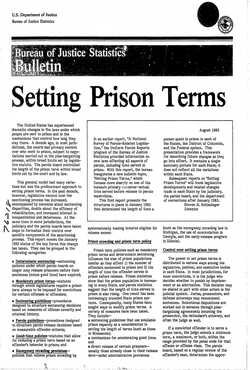Setting Prison Terms
The 1970's have seen almost every aspect of parole decisionmaking come under sustained legal and political attack. Within a few years following the 1972 Morrissey decision, court rulings were handed down requiring a variety of due-process procedures for such matters as rescinding an unexecuted parole, increasing a term, granting a parole, and requiring disclosure of records. At the same time, parole boards, as principal actors in the sentencing process, were a target of political attack by legislators, leading academicians, criminal justice officials, and the public for inequities and lack of sentencing certainty produced by release decisions characterized as capricious and arbitrary. As a consequence of these pressures, legislators have taken action over the last 4 years to constrict the amount of discretion exercised by parole boards in many different areas, including decisions to parole, due-process procedures governing parole hearings and revocations, and disclosure of certain records. State legislatures have been especially concerned with the issue of sentencing. Statutes designed to modify, replace, or selectively prohibit indeterminate sentencing have dominated criminal justice legislative agendas. As 1980 closed, 12 States had passed various types of determinate sentencing laws to replace indeterminate statutes. Over the last 4 years, five States have created contract parole programs, and five passed laws establishing specific parole guidelines, in each case an effort to improve the exercise of indeterminancy. The most common response to dissatisfaction with paroling practices has been the passage of some form of mandatory sentencing. Thirty-seven States enacted this type of legislation, which prohibits indeterminate sentencing for specified categories of offenses/offenders. The trends for the near future are suggested by recent legislative history: States will continue to pass laws to limit the use of discretion by parole boards


